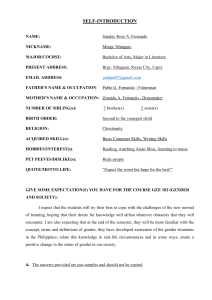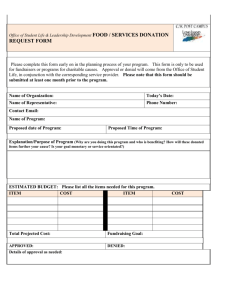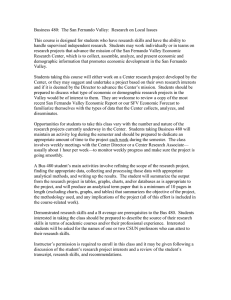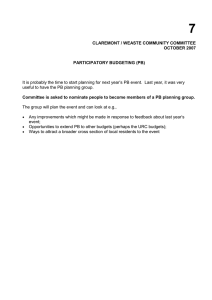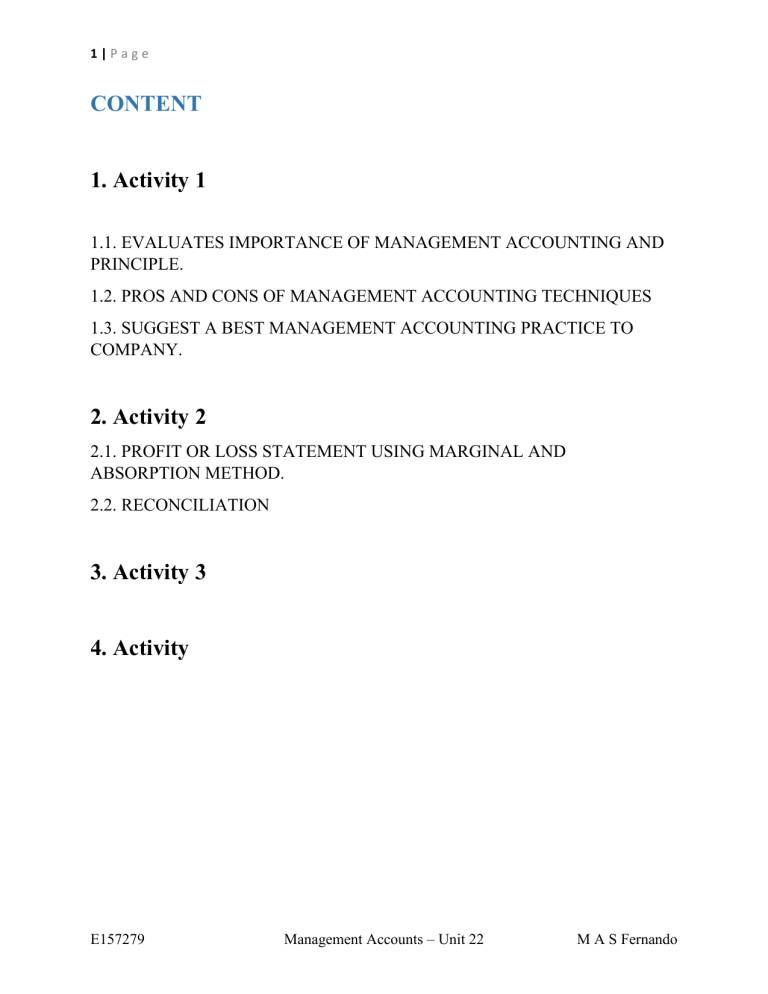
1|Page CONTENT 1. Activity 1 1.1. EVALUATES IMPORTANCE OF MANAGEMENT ACCOUNTING AND PRINCIPLE. 1.2. PROS AND CONS OF MANAGEMENT ACCOUNTING TECHNIQUES 1.3. SUGGEST A BEST MANAGEMENT ACCOUNTING PRACTICE TO COMPANY. 2. Activity 2 2.1. PROFIT OR LOSS STATEMENT USING MARGINAL AND ABSORPTION METHOD. 2.2. RECONCILIATION 3. Activity 3 4. Activity E157279 Management Accounts – Unit 22 M A S Fernando 2|Page 1. Activity 1 1.1. EVALUATES IMPORTANCE OF MANAGEMENT ACCOUNTING AND PRINCIPLE Management Accounting The term "management accounting" refers to a method of gathering, analyzing, and reporting data and is essentially a tool used internally by controllers. Planning, operational control, and performance evaluation are just a few of the uses that managers have for management accounting. In order to help with decision-making and the pursuit of objectives through analysis and communication, management accounting creates reports for corporate operations. To make sure goals are reached and decisions are well-informed, management accounting is essential for firms. Organizations can create strategies for improvement by using the data it gives on sales, pricing trends, production costs, customer satisfaction scores, and cash flow. Management accountants can aid firms in developing efficient plans for improvement by gathering and analyzing these data points. Organizations can use management accounting to help them create accurate budgets and make sure the right resources are being used to achieve their goals. Budgets are essential for measuring cash flow and performance, giving managers the ability to pinpoint areas that need improvement or modification. Management accounting approaches make it possible for managers to take preventive action and keep clear of costly mistakes by identifying prospective problems before they become significant ones. By possessing the proper data, management accountants offer insightful understanding into risks connected to projects or operations, enabling relevant actions to be made beforehand. The importance of management accounting is shown in the list below. Enhances planning - In order to prepare for the future, create budgets, make long-term plans, and improve cash management, management accounting is essential for business success. Profits and growth are maximized by being aware of this important factor. Accurate budgeting, keeping tabs on the financial position, and developing conservative estimates all depend on management accounting. The creation of customized budgets that account for necessary costs without going overboard and help businesses stay on track with their financial objectives is made possible by tracking expenses and income. An effective financial system is necessary for good long-term planning, which is vital for successful corporate operations. A company's financial health can be evaluated, and accurate projections of future revenues and costs can be made with the aid of good management accounting. The ability to plan investments and prospective long-term opportunities is provided E157279 Management Accounts – Unit 22 M A S Fernando 3|Page by this knowledge. Businesses can spot possible cash flow problems early with the use of accurate records, enabling proactive financial management and preventing costly errors. To maintain financial transparency and increase returns on investments and projects, firms need management accounting. Decision-making supports - With its ability to shed light on a business's financial performance and direct decision-making, management accounting is essential for making wise business decisions. Businesses are able to reach their objectives and maintain their competitiveness by using tools like financial planning, budgeting, and forecasting. As a result of the analysis of financial data and trends, better resource allocation, operational optimization, and improved cash flow control are made possible, decisions that have a substantial impact on a company's longterm success. Effective financial management also makes it possible to control risks better. By anticipating trends and dangers, accurate analysis assists organizations in making long-term plans that result in wise judgments. For firms to make educated decisions, management accounting is essential. Improvement of Managerial Performance - Management accounting is an essential area of finance that provides helpful information about how businesses operate and succeed. Its main objective is to offer timely information to decision-makers so they can boost productivity and profitability. Managers can find possible cost-saving possibilities and boost efficiency by gathering and analyzing financial data on cost inputs. Better resource allocation and cost containment decisions are made as a result of this knowledge. The ability to foresee the future of the company, get insights into its direction, and make more precise judgments about resource allocation and investment opportunities are further ways that management accounting improves manager performance. Strategies for Cost Control - As it assists organizations in managing expenses, comprehending financial performance, and coordinating spending with strategic objectives, management accounting is essential for enhancing cost control strategies. Accurate cost information optimizes budgeting processes and informs strategic decisions. Businesses can effectively estimate prices, set budgets, and alter those budgets as necessary by using precise cost data. This helps them avoid overspending or underspending, both of which can put them in financial trouble. For firms to decide on pricing and profit margins intelligently, accurate cost data is essential. Businesses can determine pricing that maximize profits while maintaining competition by compiling information on production, overhead, and material costs. This helps prevent clients from being overcharged or undercharged, which can have a detrimental impact on profitability and customer loyalty. Long-term cost reduction, cost reduction methods, and increased profitability all benefit from management accounting. Businesses can identify project-related expenses and make the appropriate adjustments by using budgeting strategies based on managerial accounting principles, maximizing efficiency and accomplishing strategic objectives within budgetary constraints. E157279 Management Accounts – Unit 22 M A S Fernando 4|Page Management accounting's role in maximizing profit - For companies and organizations to maximize revenues by recording, monitoring, and analysis of corporate performance, management accounting is essential. It aids in the efficient resource allocation and prioritization of growth initiatives for firms. Better strategy planning and resource allocation are made possible by management accounting's ability to foresee future performance. It helps examine historical performance, generate knowledgeable estimates, and keep tabs on spending by delivering timely financial information, ultimately maximizing profit margins. In a rising economy, management accounting is essential because it enables businesses to budget, track their financial health, analyze data, and estimate their financial success. It is necessary for making strategic decisions, locating opportunities for efficiencies, cutting costs, and maximizing profits. Management accountants are able to make better investments and maximize profitability by analyzing historical performance to find methods to increase productivity and cut costs. Additionally, they shed light on existing operations in comparison to budgeted levels and possible hazards or possibilities. Long-term success depends on having access to skilled individuals who have a thorough understanding of business processes. https://datatrained.com/dt-finance/importance-of-management-accounting/ E157279 Management Accounts – Unit 22 M A S Fernando 5|Page 1.2. PROS AND CONS OF MANAGEMENT ACCOUNTING TECHNIQUES ADVANTAGES Enhanced ability to make decisions - The information provided in charts, tables, and predictions by management accounting facilitates decision-making by allowing for thorough analysis and the right choices. The efficiency of the organization - By assessing performance, identifying deviations, and putting appropriate remedial measures in place, management accounting increases business efficiency. Financial Statement simplification - In order to make financial statements easier to grasp, the accounting branch presents data in simplified tables or charts. Transparency in costs - Management accounting ensures cost transparency, keeps track of cash inflows and outflows, and coordinates closely with IT to manage spending that are under budget. Increasing Profitability - Using capital budgeting and budgetary control, management accounting increases firm profitability by lowering expenses and product costs while also generating higher profits. DISADVANTAGES Insufficient Specification - Lack of specific rules and regulations in management accounting results in inaccurate information. Dependency - Accounting for finances and costs is a foundational component of management accounting, assuring the accuracy of records and information. Individual bias - Due to limitations in its ability to understand and analyze data, management accounting is subject to personal bias. Only Provides Data - While lacking in action plans or decision-making, management accounting but provides data to help management in their job. Uncertain - Management accounting offers information for making future plans, but results may be impacted by unclear futures. E157279 Management Accounts – Unit 22 M A S Fernando 6|Page 1.3. SUGGEST A BEST MANAGEMENT ACCOUNTING PRACTICE TO COMPANY. Each of the Principles serves as the foundation for the practice areas that the management accounting function must master in order to guarantee their stakeholders long-term financial success. So, for the L Limited, these are the suggested practices. Internal audit - Internal auditors are unbiased professionals who report directly to top management or the board of directors. They evaluate how well departments and company operations adhere to predetermined criteria. Their job is to provide input for improvement in order to strengthen existing enterprises. Although not exactly a management accounting function, this is included as a practice area because management accounting contributes so greatly to the aspects of the business that an internal audit looks at. Decisions about price, discount, and product - The business and management accounting collaborate to determine the best items or services to offer, as well as the selling price and potential discount structures. Resources Management - Resource management must be done correctly and on time for organizational decision-making. Management accounting may assist the company in making continuous, efficient, and effective improvements by matching resources with strategic objectives. Roles, responsibilities, policies, procedures, and strategies for hiring, training, and performance are all laid out in a comprehensive human resources management plan for L limited. Thus, if we practice this for a short period of time, we can advance further. Risk Management - Improvements in financial performance, market position, client services, and employee productivity are all advantages of L Limited risk management. Improvements in location-specific and macroeconomic indices are examples of secondary impacts. In order to detect, evaluate, and address risks that result from an organization's actions, this practice area takes both internal and external elements into consideration. Therefore, if we can reduce the risk or turn it into an opportunity, we can deal with the situation. E157279 Management Accounts – Unit 22 M A S Fernando 7|Page Activity 2 2.1. PROFIT OR LOSS STATEMENT USING MARGINAL AND ABSORPTION METHOD. E157279 Management Accounts – Unit 22 M A S Fernando 8|Page E157279 Management Accounts – Unit 22 M A S Fernando 9|Page E157279 Management Accounts – Unit 22 M A S Fernando 10 | P a g e E157279 Management Accounts – Unit 22 M A S Fernando 11 | P a g e 2.2. RECONCILIATION June July Profit using absorption costing 373,150 499,900 (-)fixed overheads in closing inventory (5000*8) (40,000) (+)fixed overhead in opning inventory (5000*8) profit according to marginal costing E157279 40,000 333,150 Management Accounts – Unit 22 539,900 M A S Fernando 12 | P a g e 3. Activity 3 The planned import ban will have a significant negative effect on enterprises that rely on imports, especially Micro, Small, and Medium Enterprises. The Sri Lankan tech sector will also encounter challenges, as will street vendors, firms that deal in raw materials, construction, textiles, and other industries. Reduced competition will increase economic losses by forcing customers to pay more, create less employment, and engage in less activity. As a result, exports and imports of necessary goods would suffer. This will also help to create new illegal markets and corruption. The current approach is counterproductive since investments will be made in non-tradable commodities and import substitutes rather than exports. An export-oriented economy is essential to solving the nation's serious difficulties. Bans and limitations on imports will prevent this transition. In order to shift output from non-tradeable to tradable, experts advise combining expenditure cutting and switching policies. Import restrictions will worsen the non-tradable bias, hindering the shift to an export-oriented economy. Imposing import restrictions in Sri Lanka would have a favorable influence for L Limited. Advantages of imposing restrictions 1. Defending native industry against international competition. The ease with which international products and services can be accessed domestically boosts domestic competitiveness. 2. Keeping budding industries alive until they are fully developed and competitive globally. Some nations wish to guarantee the success of their strategic sectors. These sectors typically contribute to the economy, employment, technology, and value chains with a variety of other sectors. 3. Obtaining domestic work and revenue. Due to the money flow from domestic to foreign producers, imports are advantageous. Additionally, they will raise production when imports rise. It generates cash and jobs there, but not domestically. 4. To bring in money for the government. Import tariffs provide the government with a revenue stream aside from corporate and personal taxes. 5. As retaliation for restrictions of a similar nature imposed by trading partners. Countries dislike unfair trade tactics used by their trading partners, such as dumping. Therefore, it is in their best interest to exact revenge on the partner nation. Disadvantages of imposing restrictions 1. Higher price - Costs and selling prices are raised by trade obstacles. For instance, domestic customers pay more when tariffs on consumer goods are in effect. If it holds true for imports of capital goods and raw materials, production costs will increase. The rise in costs will probably be passed on to consumers through the product's selling price. E157279 Management Accounts – Unit 22 M A S Fernando 13 | P a g e 2. Less Choice - Consumers have more options thanks to free trade. Because they are not domestically manufactured, some products, like luxury goods, rely on shipments from abroad for their supply. As a result, they have more options in terms of both price and quality. 3. Damaging future competitiveness - Initially, trade restrictions were put in place to safeguard domestic businesses. However, occasionally, this protection discourages indigenous producers from innovating in favor of making them more efficient and competitive. Their level of competition has remained unchanged over time. Additionally, they grow to rely heavily on government protection. 4. Activity 4 Ways In Which Organizations Could Use Management Accounting To Respond To Financial Problems. The following are some of the approaches that the accounting management system uses to achieve its goals: Margin Analysis Margin analysis is mostly focused on the gains that come with product optimization. One of the crucial tasks of accounting management is margin analysis. It contains a break-even analysis evaluation, which is used to determine the best product mix for a company. Constraint Analysis An organization's product line analysis can help pinpoint the bottleneck, problems it causes, and how it affects the company's ability to generate income. Capital Budgeting Analyzing the data necessary to make critical decisions about capital expenditures is known as capital budgeting. Analysis of capital budgets aids management in determining net present value and rate of return for budgetary purposes. Integration Of Accounting Management To The Organization And Its Benefits Accounting management plays a significant role in cost control and assisting organizational decision-making. In order for management to make good decisions for the organization, it is necessary to evaluate information. The advantages are as follows: Increasing organizational effectiveness is facilitated by accounting management. Fixing the objective and product pricing is made easier with accounting management. E157279 Management Accounts – Unit 22 M A S Fernando 14 | P a g e Accounting management facilitates forecasting and budget preparation, making it simple for management to project costs and revenues. Accounting management aids in the development of improved organizational decisionmaking. Accounting management aids in identifying strategies for businesses to reduce production costs and increase profitability. E157279 Management Accounts – Unit 22 M A S Fernando
